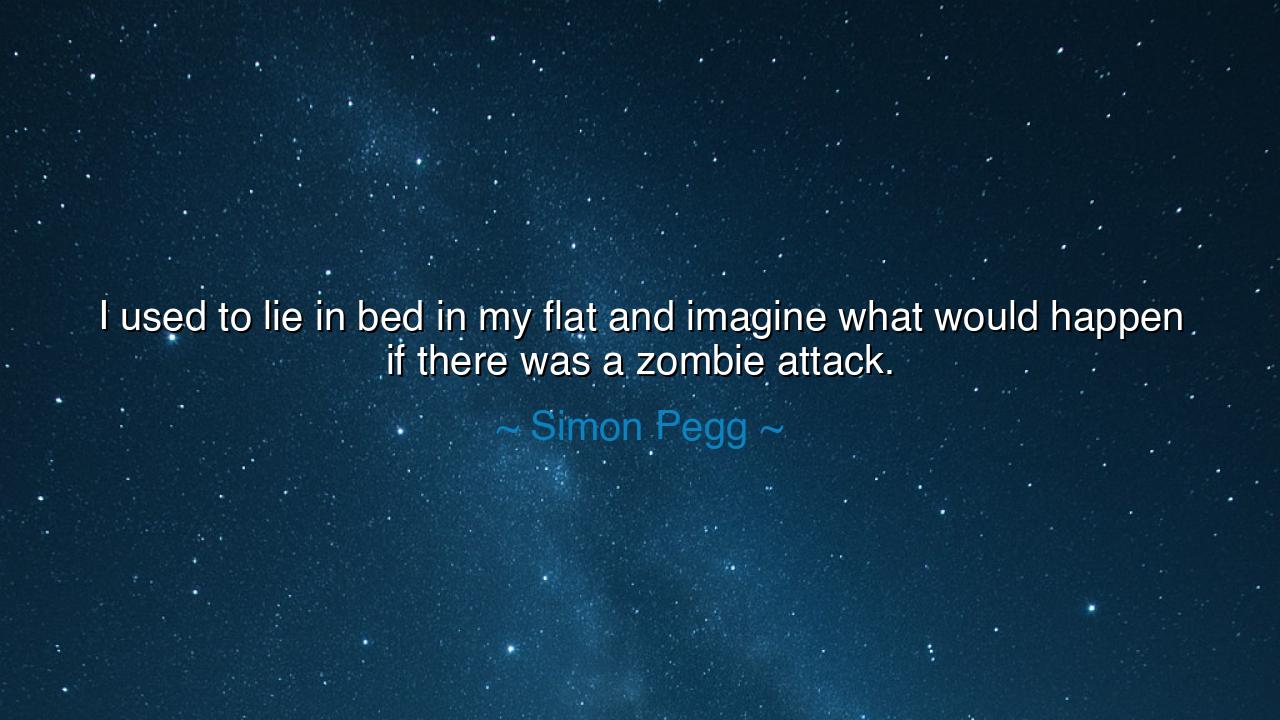
I used to lie in bed in my flat and imagine what would happen if
I used to lie in bed in my flat and imagine what would happen if there was a zombie attack.






"I used to lie in bed in my flat and imagine what would happen if there was a zombie attack." Thus spoke Simon Pegg, the jester-philosopher of our age, whose laughter hides the wisdom of dreamers. At first glance, these words may seem the idle musings of a mind lost in play—but look deeper, and you will see in them the secret fire that fuels all imagination. For what Pegg describes is not mere fantasy, but the eternal act of creation: the moment when a mind, restless and curious, dares to wander beyond the dull walls of the ordinary world. His zombie attack is not a nightmare, but a metaphor—a symbol of the human hunger to explore the unknown, to wrestle with chaos, and to find meaning in the absurd.
The ancients too dreamed in this way. In their sleepless hours, they imagined dragons coiling beneath the earth, gods walking among mortals, and heroes rising from humble origins to save the world. What Simon Pegg did in his small flat, they did in their temples and their poems. The imagination of one man lying awake at night is kin to the imagination of all humankind. For the act of imagining—even something wild, like a zombie apocalypse—is the mind’s way of preparing for life’s storms. We dream of catastrophe not because we seek fear, but because we wish to understand courage. We imagine chaos to discover what kind of order we might build when everything else falls apart.
It was from such dreams that Pegg’s masterpiece, Shaun of the Dead, was born. Out of his playful pondering came a story both humorous and profound—a tale not merely of zombies, but of the resilience of ordinary souls in extraordinary times. In his imagination, Pegg found a mirror for the world itself. For do not we, too, face our own kinds of apocalypse? The end of a love, the loss of a job, the quiet fading of youth—all these are small zombie attacks of the soul, moments when life shambles toward us with dead eyes and heavy steps. Yet Pegg teaches us, through laughter, that even in these moments, there is hope, creativity, and wit—that imagination is the sword with which we defend our spirit.
Think also of Mary Shelley, who once sat by the fire and imagined what might happen if man could create life from death. Her dream became Frankenstein, a story born from sleepless hours, when the shadows of the mind turned into art that has haunted humanity for centuries. Like Pegg, she lay awake and let her thoughts wander into horror, not to frighten herself, but to reveal truth. For both the comedian and the poet understand that within every absurd or terrifying fantasy lies a reflection of reality. The monsters we imagine are only symbols of the fears we carry within.
Thus, Pegg’s quote, though playful, hides a deeper lesson about the power of imagination. To imagine—even foolishly—is to live twice: once in the world as it is, and once in the world as it could be. The mind that dreams of zombies today may dream of inventions tomorrow. The child who imagines monsters may grow into the scientist who cures disease, or the artist who brings laughter to a weary generation. Every act of creation begins with someone who dared to imagine something ridiculous and refused to dismiss it.
Yet there is also wisdom in the playfulness itself. Too often, we grow old not because years pass, but because we stop dreaming. We call it maturity when we abandon imagination, but in truth, it is surrender. Pegg reminds us that the heart of the creator never sleeps—it lies awake, wondering, building worlds from the dust of thought. He who can find joy in imagining even the impossible will never be defeated by reality. To lie in bed and dream is not laziness; it is the quiet labor of the soul preparing for creation.
Therefore, my children of curiosity, take this teaching to heart: never be ashamed of your imagination, however strange, however “annoying” or absurd it may seem. In your idle thoughts, you forge the beginnings of greatness. When the world seems gray, retreat to that sacred inner chamber where the mind is free to play. Dream of what could be—yes, even of zombies if you must—for imagination is the rehearsal of courage, and courage is the foundation of all creation.
And remember: the dreamer lying awake in a small room may awaken a generation. The laugh you share, the story you imagine, the world you invent in the silence of night—these are the threads from which humanity weaves its endless tapestry. So cherish your imagination, guard your optimism, and let even your silliest dreams live—for through them, like Simon Pegg, you may one day turn fear into laughter, and chaos into art.






AAdministratorAdministrator
Welcome, honored guests. Please leave a comment, we will respond soon